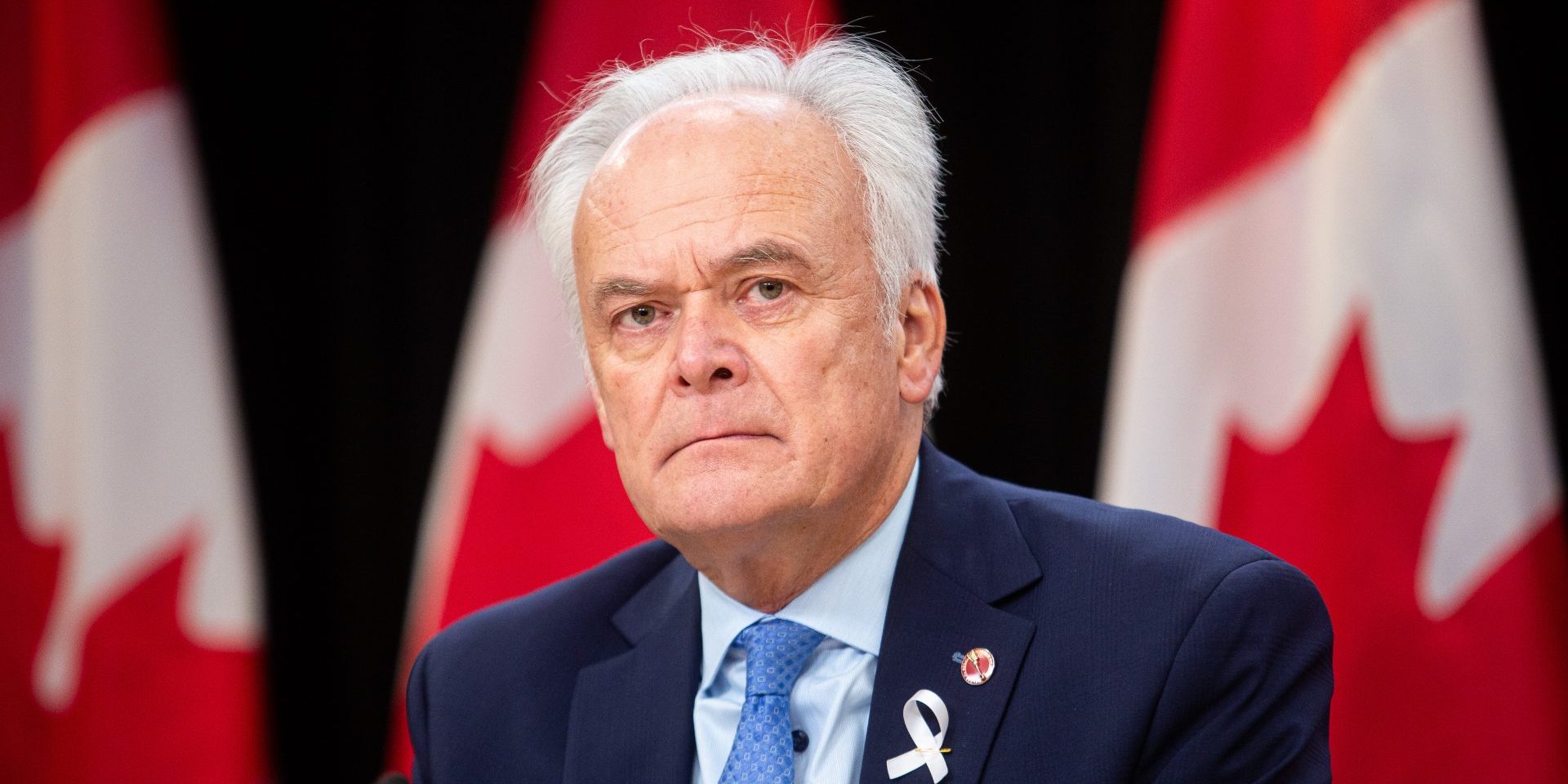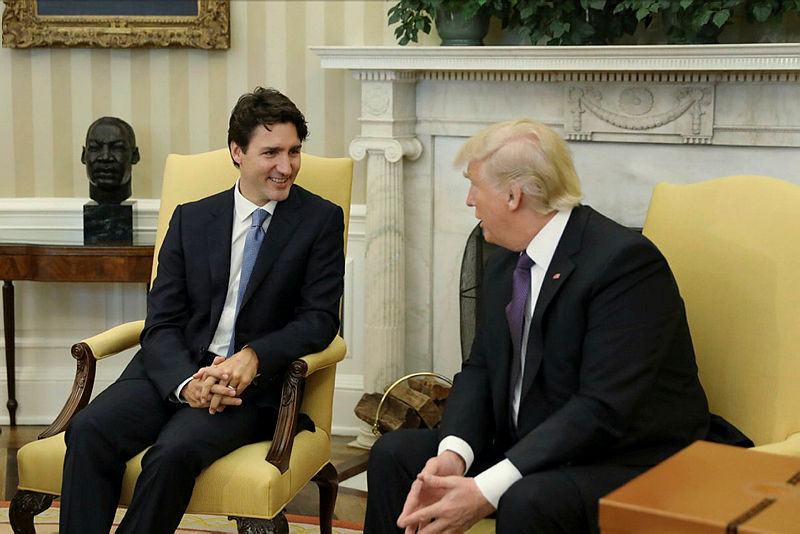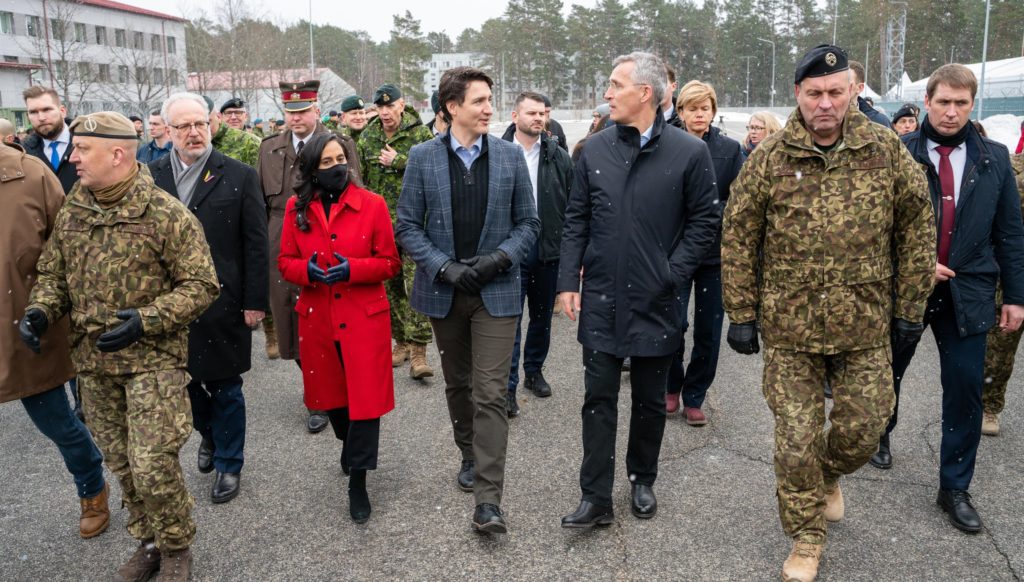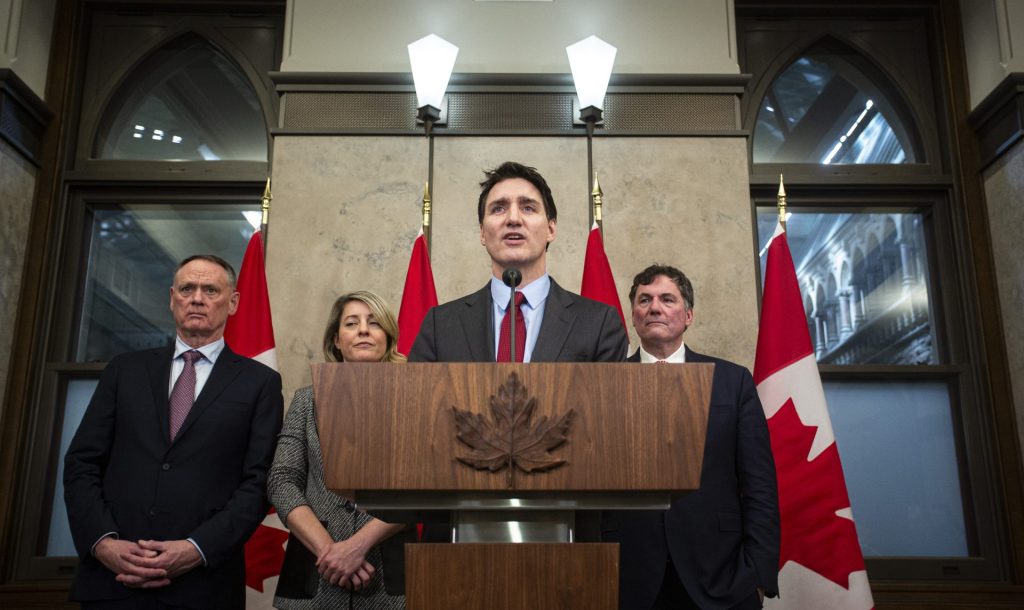‘People aren’t laughing as much anymore,’ says Sen. Boehm after Trump repeats calls for Canada to become 51st state

With the economic threat of a trade war with the United States staved off for now, the existential threat that U.S. President Donald Trump poses for Canada still looms large.
Almost lost in the chaos of the Feb. 3 negotiations—before Prime Minister Justin Trudeau (Papineau, Que.) announced late that afternoon he’d secured a 30-day delay on incoming American tariffs—Trump was asked what the PM could do to change his mind on levying tariffs against Canada.
“I’d like to see Canada become our 51st state. We give them protection—military protection. We don’t need for them to build our cars,” said Trump to reporters in the Oval Office on Feb. 3 before his second call of the day with Trudeau.
These “51st state” comments from Trump aren’t new, but given the re-elected U.S. president’s renewed threats against Canada, Canadians are taking the comments more seriously this time around.
Independent Senator Peter Boehm (Ontario) recalled being in the room in 2018 when Trump made that comment.
“Everyone laughed. Obviously, he made it again when the prime minister was in Mar-a-Lago, and everyone laughed. And he keeps saying it, and people aren’t laughing as much anymore,” said Boehm, a former career diplomat who was Canada’s deputy minister for the G7 Summit and Trudeau’s personal representative from July 2017, until his retirement in September 2018. Boehm joined the Red Chamber that fall.
Boehm pointed to Trump’s inauguration speech as indication of the president’s imperialist motivations.
“The president talked about a manifest destiny for the future. He talked about territorial expansion of the U.S. So all of this would lead us to conclude that there might be a grain of truth,” said Boehm.
In his Jan. 20 address, Trump said: “the United States will once again consider itself a growing nation—one that increases our wealth, expands our territory, builds our cities, raises our expectations, and carries our flag into new and beautiful horizons. And we will pursue our manifest destiny into the stars, launching American astronauts to plant the Stars and Stripes on the planet Mars.”
Trump’s manifest destiny comments referred to space exploration, but his talk of “territorial expansion” fits into a broader pattern of remarks concerning Canada becoming the 51st state—including repeatedly referring to Trudeau as a ‘governor’—taking back the Panama Canal, and buying Greenland. Trump has also talked about wanting Canada’s waters, describing Canada as having a “very large faucet” that could be switched on.

Former Liberal foreign affairs minister Irwin Cotler said Trump’s comments should be seen primarily as “baiting rhetoric”—like the kind described in Trump’s book The Art of the Deal.
“So we’ll see more of this bluster,” said Cotler. “The question is: how much the bluster finds expression in policy?”
Cotler said the stayed executive order implementing tariffs is one example of the rhetoric nearly becoming policy. But it remains to be seen whether Trump will domestically frame that outcome as a win and move on, or if he will again manifest it as policy as deadlines to review potential tariffs approach.
Trump’s taunts may have actually had a positive impact on Canadian sovereignty, Cotler said, because they have “brought us together as a country.”
“We’re less of the post-national state now, and speaking more about our own assertion of national identity and sovereignty,” said Cotler. “That’s a good thing.”
He added that the motivation it’s created for Canada to reduce internal trade barriers, diversify external trading relationships beyond the U.S., increase defence spending, and improve border security are also positive outcomes for boosting sovereignty.
Annexation vexation
While Trump’s comments about Canada joining the United States are troubling, experts said concerns that America would officially annex this country are minimal.
“The prospect for a formal annexation is remote. It would have to be affected by military force, by an invasion of our country by bound forces by the United States, and that’s not going to happen. Trump knows that’s not going to happen,” said Ben Rowswell, convenor of the Circle for Democratic Solidarity, and a former Canadian ambassador to Venezuela.
Alasdair Roberts, author of The Adaptable Country: How Canada Can Survive the Twenty-First Century, said Congressional approval would be hard to get for Trump to formally annex us.
“I don’t think he seriously wants or expects Canada to become a 51st state. He probably knows that’s not going to happen. And practically speaking, no Republican would support that,” Roberts, who’s also a professor at the University of Massachusetts Amherst, told The Hill Times.
“Even if it were possible—because Canada wouldn’t be the 51st state, it would be several states—and if several new states were added to the union, the electoral college would go basically permanently blue. So that’s just bluster.”

Something that could work in Canada’s favour in preventing a formal military annexation are both countries’ membership in the NATO military alliance.
“If one looks at the security element from an Article 5 perspective in NATO—that is if one member is attacked the others will support—never would I have thought in my previous career, and even now, that that would even be a possibility in terms of the North American relationship, and particularly between Canada and the U.S.,” said Boehm.
Article 5 says that NATO member states agree that an armed attack against one “shall be considered an attack against them all,” and they will come to the aid of the targeted member “to restore and maintain the security of the North Atlantic area.” The treaty’s mutual defence clause treaty only refers to an armed attack and makes no mention of annexation or aggression via economic coercion.
Boehm, who’s also served at the Canadian embassy in Washington, D.C., said typically when an “annexation takes place, there’s a referendum—usually a bogus one—before anything happen.” But he added that that likely won’t happen since polling numbers have indicated how unpopular annexation is in Canada.
Standing up for sovereignty
What are experts concerned about? An erosion to Canada’s sovereignty.
Roberts said Trump’s efforts suggest the president wants to weaken Canada in this regard.
“He wants to weaken the Canadian economy and destabilize Canadian politics so that the country is in a much weaker negotiating position on a range of matters. I suspect for him the ideal outcome is a Canada that is formally independent, but practically subject to U.S. influence,” said Roberts.
“It’s about the erosion or loss of Canadian sovereignty—the effective capacity of Canadians to govern their own country. That’s what is at issue. And you can lose effective sovereignty, even if you’re still formally independent,” added Roberts.
Rowswell added that a loss of sovereignty can happen “once there’s a general perception among your own population that your own institutions are no longer in control, that the significant decisions affecting our country are made by a foreign power.”
This ‘perception’ is dangerous, and Rowswell said Canada needs to send a strong response.
Rowswell said he took issue with White House Press Secretary Karoline Leavitt telling CNN that “Canada is bending the knee, just like Mexico” following news that tariffs were paused.
“That’s an official pronouncement from President Trump’s own spokesperson, that Canada is now subordinate to the United States. I think on that basis, we would be entirely justified in renouncing the agreement that we made [on Feb. 3] and challenging the president to apply the tariffs. To teach the United States a lesson that Canada is stronger than you know, that our knee is not bowed. We’re standing on our two feet,” said Rowswell.

A ‘collective’ counterweight
Standing up to Trump is one thing, but questions have emerged about whether Canada would be alone if he were to make good on efforts to undermine the country’s independence.
“Nobody is going to come to the rescue if Canadian sovereignty is at risk. The only people who can preserve Canadian sovereignty are Canadians,” said Roberts. “Every other country in the world will be guided by what lies in its national interest.”
Where Canada and other countries can come together is by protecting multilateralism.
“The only way that Trump will be stopped is if other liberal democracies band together to pool their resources to overwhelm the power of the United States as it turns from ally and partner to adversary,” said Rowswell. “And that’s why we’ve got to redouble our relations with other countries, to strengthen our alliances and institutions through which we exercise collective power.”
Roberts said strengthening ties with other nations is not only imperative given the current situation, but also necessary in the long term.
“This isn’t just about Trump. I think we should understand that even if a Democrat were in office, the United States would be more inwardly focused than it has been in the last 40 years. That era of globalization—in which we could take for granted that the United States was interested in promoting openness and democratic values internationally—that era is over,” said Roberts.
Boehm said bolstering our multilateral relationships will be a “very important counterweight to our almost overwhelming bilateral relationship with the United States.”
And with Trump also putting the European Union in his tariff crosshairs, this could be the right moment for Canada to ensure it has that heavyweight in its corner to use their “collective power” to resist Washington’s “economic aggression.”
“It’s essential for us to reach out to European countries right away, to say that we’ll stand shoulder-to-shoulder with them and to co-ordinate any response to American tariff threats,” said Rowswell.
This is a strategy that Foreign Affairs Minister Mélanie Joly (Ahuntsic-Cartierville, Que.) said she’s pursuing.
“We need also to work along with allies that we haven’t always worked as closely with, which are of course, Europeans, the Brits, and also our friends in Asia,” Joly told reporters on Feb. 4, adding that includes Canada’s second-biggest trading partner, Mexico. “We should never take it for granted.”
But Roberts said we can’t solely be outwardly focused, and must also have “a national conversation about what we’re trying to accomplish as a country.”
Roberts said he’s calling for a royal commission, similar to the 1982-85 Macdonald Commission on the “long-term economic potential, prospects, and challenges facing the Canadian federation,” and for more regular first ministers’ conference to help “promote” national consensus.
“Presently, we don’t have the Team Canada approach,” he said. “If you were at a team, you would be practicing in the off season. At the moment, we have first ministers who only meet after the crisis hits.”—With files from Ian Campbell
sduch@hilltimes.com
The Hill Times





 LICENSING
LICENSING PODCAST
PODCAST ALERTS
ALERTS













